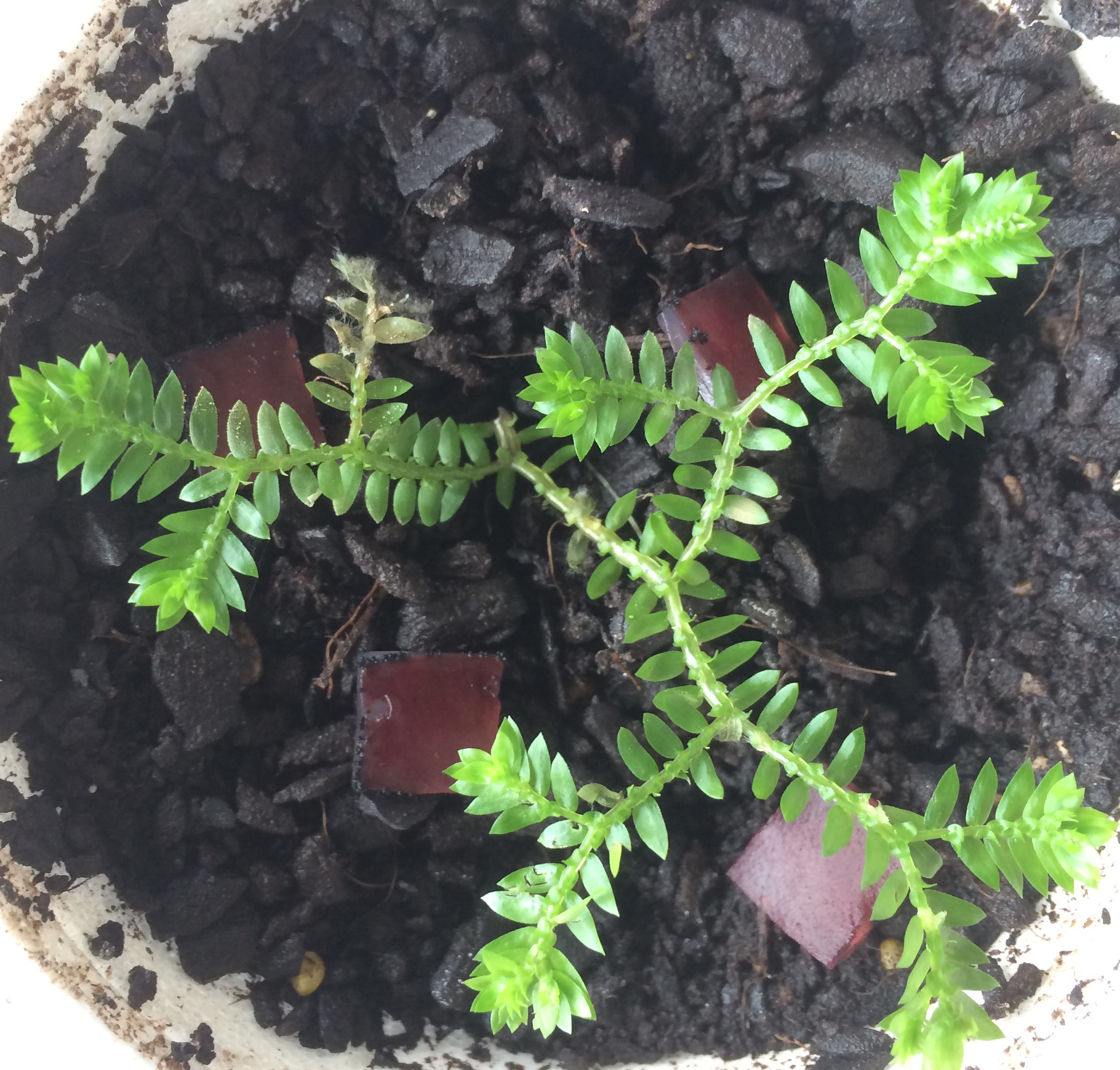The power of pathogens: Unitec scientists and students have been researching natural herbicides to control an invasive weed that threatens New Zealand’s native ecosystems.
Research on natural enemies of the invasive African club moss (Selaginella kraussiana) is helping to protect New Zealand’s native ecosystems, while enabling Unitec students and graduates to undertake industry-generated research. Led by Dr Dan Blanchon, Associate Professor and Head of Environmental and Animal Sciences at Unitec, and Dr Nick Waipara, Auckland Council’s principal advisor of biosecurity, students and graduates have been investigating possible natural pathogens of the invasive introduced plant. The hope is to find a fungus which could be used to create a mycoherbicide (fungal herbicide) that would help to control the plant, which originates from Madagascar and other wet areas of Africa.
Through DNA testing of approximately 100 fungi found on discoloured or wilted leaves of the club moss, two promising fungal isolates have emerged as natural enemies of the club moss. There are a number of fungal isolates still to be tested, with the hopes that an even stronger candidate will be found. “In an ideal world, we’re looking for something that really kills or knocks back the club moss but doesn’t attack anything else,” explains Blanchon.
African club moss is common in Auckland and Northland, but the Department of Conservation is now seeing it spread further, including into parts of the West Coast. The plant establishes itself in shady, damp environments, spreading along tracks and into the bush on people’s boots, through rainwater and through its own spores. “It is going to be a pest of national significance,” Waipara says.
The research project was initially commissioned by Auckland Council in 2011, with the aim of finding a biological control for the invasive plant, as per their current pest management strategy. If one can be found locally, it will save having to look overseas to the plant’s original environment. This would be an expensive exercise and potential risks are involved if another species was to be introduced to New Zealand.
Waipara asked Unitec to look at the impacts of the African club moss plant on the native environment and to explore possible solutions to these impacts. Though the weed and its negative effects were known, biological control research had not been undertaken in New Zealand or overseas, causing the weed to be overlooked in many pest management programmes. “This weed is an issue for northern New Zealand and hasn’t had a lot of research around it,” he explains.
The plant is hard to control, as it creates thick layers of ground cover, which smother native plants and seedlings. Using general herbicides would kill these seedlings, mosses, ferns and lichens as well as the African club moss, which would return at a faster rate than the native species and inhibit their growth. “What you really want is to target this [club moss] specifically,” explains Blanchon.
The tools that the Council can use against the plant are limited, and being able to combine biocontrol with chemicals and hand removal would help, says Waipara. “The more armoury you have against some of these pests the better.”
With a background in scientific research himself, Waipara has been collaborating with Blanchon and students on the research. The Council runs a biosecurity studentship summer programme with Unitec, and initially funded summer student Hayley Nessia to undertake research, followed by other students and graduates, including Matt McClymont, Christy Reynolds, Sarah Killick and Orhan Er. Impact studies conducted showed that the plant had an invasive impact in the native ecosystem, including suppressing seedling growth, and causing a significant decrease in the abundance of native plants.
The next stage involved looking for pathogenic fungal isolates to reduce these impacts. Samples of unhealthy-looking plants were collected from areas of Auckland and Northland, including parts of the Waitakere and Hunua Ranges, Whangarei and Waiheke Island. These were screened in the Unitec laboratory for fungi. A sample of each fungal isolate was taken and identified through a number of processes, including DNA sequencing through Massey University. These fungal isolates were reapplied to damaged and undamaged samples of the club moss, to check for pathogenicity. Two promising pathogens emerged, including Phoma selaginellicola, which attacks African club moss significantly but does not kill it however, as it seems to be specific to African club moss, the bonus is that it would not kill other plants if used as a mycoherbicide. The other candidate is Pestalotiopsis clavispora, though it is more of a ‘generalist’, says Blanchon, so other plants could be at risk if it was used as a biocontrol agent.
Whether or not the pathogenic fungi would be successful as biocontrol agents in the field has not been determined yet. The project is nearing completion, and soon, Blanchon and his team will submit recommendations to the Council. If they have found an isolate that shows enough promise as a biological control, the Council may look to develop this as a mycoherbicide. A number of trials would need to be conducted to ensure it is safe, and to gauge any potential adverse effects on native club mosses and other native species If none of the fungal isolates are suitable as a biocontrol, the next phase may involve the Council going offshore. Other options include taking an integrated approach, says Blanchon, such as spraying an initial low-dose herbicide followed by a mycoherbicide that would hopefully kill the weakened African club moss. “The low-dose herbicide would weaken everything, but the native stuff should recover,” he explains.
Whatever the outcome, Waipara says Unitec’s research has been critical in helping the Council to determine their next step. It has been beneficial for Unitec as well, says Blanchon, with students and graduates getting to work on a real-life research project which combines biodiversity with biosecurity. They have also had the opportunity to be hired as researchers and to contribute to a number of published studies.
Contact: Dr Dan Blanchon dblanchon@unitec.ac.nz
Dr Nick Waipara Nick.Waipara@aucklandcouncil.govt.nz

Leave a Reply